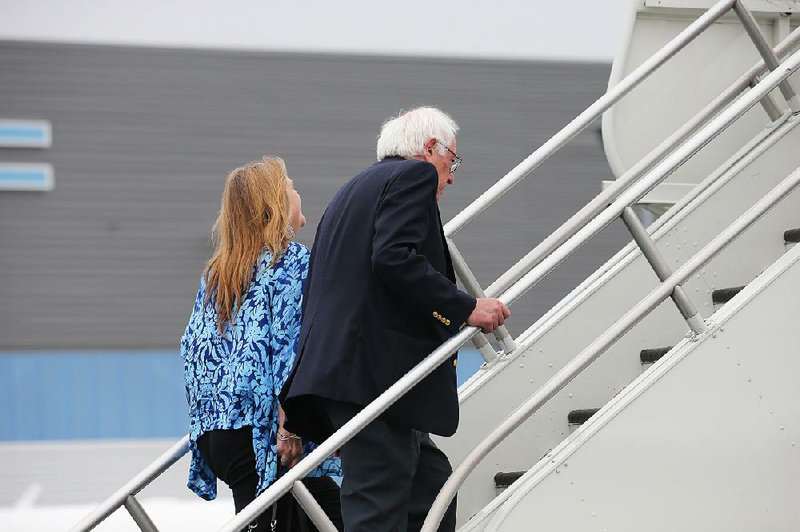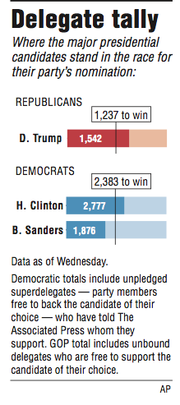WASHINGTON -- A day after declaring victory in the race for the Democratic presidential nomination, Hillary Clinton on Wednesday set out on the difficult task of uniting her party for the five-month campaign against Republican Donald Trump.
FULL ELECTION COVERAGE
Neither Clinton nor Trump had public events Wednesday, both preparing for the next hurdle between themselves and the White House.
But in a telephone interview, Clinton put focus on the larger picture.
"I think it's time that we move forward and unite the party and determine how we are going to defeat Donald Trump, which is our highest and most pressing challenge right now," she said.
She said of fellow candidate Bernie Sanders of Vermont: "He has said that he's certainly going to do everything he can to defeat Trump. I'm very much looking forward to working with him to do that."
Democrats on Wednesday urged Sanders to end his campaign against Clinton but still tried to give him space to make that difficult decision.
"Let him make that decision. Give him time," Vice President Joe Biden said when asked whether it was time for Sanders to halt his effort.
Clinton cruised to victories Tuesday in four of the party's contests -- California, New Jersey, New Mexico and South Dakota. Sanders picked up wins in Montana and North Dakota.
Clinton remained short of securing the nomination, ending the night with a total of 2,203 pledged delegates to Sanders' 1,828. It takes 2,383 to win the party's nomination.
But Clinton's campaign has said that with the backing of superdelegates -- party leaders and elected officials who can support the candidate of their choice -- she will be the party nominee. So far, she has amassed public support from 574 superdelegates, giving her a total of 2,777 delegates. Sanders has a gathered a total of 1,876 delegates.
"Barriers can come down. Justice and equality can win," Clinton said at a rally Tuesday night in Brooklyn, N.Y. "This campaign is about making sure there are no ceilings, no limits on any of us. This is our moment to come together."
On the Republican side, Trump, as the only candidate with an active campaign, was victorious in the final five GOP nominating contests, lifting his bound delegate total to 1,447 and tallying enough support to secure the nomination. GOP rules require a candidate to have at least 1,237 delegates to be the nominee.
Trump also has the backing of 95 unbound delegates, who are free to support the candidate of their choice, increasing his party support to a total of 1,542 delegates.
Sanders' next steps
As Clinton celebrated what she called a "milestone" -- as the first woman on track to lead a major political party's presidential ticket -- Sanders vowed to continue his campaign to the final Democratic contest, in the District of Columbia next week.
The senator was to return to Washington today to meet with President Barack Obama and Senate Minority Leader Harry Reid and to speak at a rally.
Obama is expected to endorse Clinton after his meeting with Sanders, and Reid is prepared to discuss with Sanders how he might advance his goals back in the Senate.
"It's not a one-way street. They're both going to have to, in effect, compromise," Reid said in an interview Tuesday, calling on the two candidates to reconcile their campaigns.
Biden, too, was arranging calls with both Sanders and Clinton to discuss the race before making a public endorsement.
In New York, Obama was raising money for Democrats and reaching out to young voters, taping an appearance on NBC's The Tonight Show to be broadcast tonight.
"It was a healthy thing for the Democratic Party to have a contested primary. And I thought Bernie Sanders brought enormous energy and his new ideas, and he pushed the party and challenged them. I thought it made Hillary a better candidate," Obama told host Jimmy Fallon during the taping. "My hope is that over the next couple of weeks, we're able to pull things together. "
White House spokesman Josh Earnest said Obama has deliberately kept in close touch with his supporters even after his last election in 2012 and that he would be a "particularly influential advocate" for the Democratic nominee.
While Reid has stopped short of publicly calling for Sanders to drop out, other Democrats were less restrained Wednesday. Sen. Bill Nelson of Florida said Sanders should "stand down," and Sen. Jeanne Shaheen of New Hampshire said she would like to see him wind down his candidacy sooner rather than later.
There were signs that Sanders was willing to listen. In his remarks Tuesday night at the Santa Monica Airport in California, he that "we are in this together" and argued that a tenet of his campaign was that "we will not allow right-wing Republicans to control our government."
"The struggle continues," he said, thanking supporters for "being part of the political revolution."
Aides said the process of determining Sanders' next steps would begin Wednesday aboard the campaign's airplane as the candidate and top advisers held conversations about his options while flying to Vermont from Los Angeles.
"He is certainly against Trump and will do anything to stop Trump," said Tad Devine, a senior strategist for Sanders. "If he is going to get out and endorse [Clinton] before the convention, how do you do that in a way to persuade as many of his supporters as possible to support her? Not just, 'I'm for her,' but, 'You be for her, too.'"
Devine said there have been a number of conversations between the two camps, including talks between Clinton campaign manager Robby Mook and Sanders campaign manager Jeff Weaver. Some of those have had to do with issues about the Democratic platform.
"Things are going in a positive direction," Devine said. "No negotiations are going on, but there is interaction."
Meanwhile, Sanders is preparing to lay off about half his campaign staff, two people familiar with the plans said Wednesday. They spoke on condition of anonymity because they weren't authorized to speak publicly about the layoffs.
Many of those being laid off are advance staff members who often help with campaign logistics, as well as field staff members who have been working to gather votes for the senator, according to a campaign official and a former campaign staff member. Some campaign workers may move into jobs at Sanders' Senate office, but others will be terminated, they said.
Looking forward
For Clinton and Trump, however, the general election campaign begins now. The businessman is planning a major speech next week about the Clinton family.
"I think we are gonna do it in Washington at the club," Trump said in an interview Wednesday in his Trump Tower office, referring to Trump National Golf Club outside Washington.
Despite handily winning GOP contests Tuesday in California, New Jersey, New Mexico, South Dakota and Montana, Trump remained in damage control mode over his ethnicity-based criticism of a Hispanic judge.
After House Speaker Paul Ryan called the comments "racist," Trump sought to calm worries in the victory speech for his final batch of primary wins.
"I understand the responsibility of carrying the mantle and I will never, ever let you down -- too much work, too many people, blood, sweat and tears," Trump said at a rally at one of his golf courses in suburban New York City. "I will make you proud of your party and our movement, and that's what it is, is a movement."
Despite Ryan's concerns about Trump's remarks, the Wisconsin Republican reaffirmed his support in a private meeting with fellow GOP lawmakers Wednesday. It was Ryan's first meeting with House Republicans since he announced last week his support for Trump's campaign.
A Ryan aide said the speaker told his colleagues that he would continue criticizing the businessman when needed. Ryan's remarks were greeted by applause, according to the aide, who spoke on condition of anonymity to describe the private remarks.
Clinton herself had barbs ready for Trump, calling the businessman's behavior that of a "demagogue."
"It's classic behavior by a demagogue," she said in the telephone interview. "We've seen it many, many places and times in the world, and that's why I think it's so dangerous."
The Democratic candidate questioned whether Trump's behavior was a political stunt.
"I don't know if this is just, you know, political gamesmanship that he thinks plays to the lowest common denominator, but whatever the reason for it is, it's wrong and it should not be tolerated by anybody," she said.
But even as she questioned the sincerity of the real estate mogul's rhetoric, Clinton said voters need to take his words seriously and called them evidence that he is untrustworthy, unqualified and unprepared for the rigors of the White House.
While stopping short of calling Trump a racist for his recent comments about the federal judge overseeing a class-action lawsuit against Trump University, Clinton said her rival has a "very unfortunate and divisive tendency to attack all kinds of Americans."
Trump succeeded against a slate of primary opponents without much change in strategy, and aides are discussing ways to keep Trump focused during the next few weeks.
At the same time, the Trump operation is relying on the Republican National Committee, as well as on several super political action committees that support him, to handle tasks typically overseen by a presidential campaign.
The Trump campaign is also working to boost its fundraising operations, with the candidate holding at least four events this week.
But Trump distanced himself from his own fundraising estimate of $1 billion, refusing to commit to collecting even half that amount and saying his campaign didn't need much money to win the White House.
"There's no reason to raise that," Trump said in the Wednesday interview. "I just don't think I need nearly as much money as other people need because I get so much publicity. I get so many invitations to be on television. I get so many interviews, if I want them."
Trump's most consequential decision between now and the Republican National Convention in July is selecting his running mate.
Trump said Wednesday that he has narrowed his running-mate search to four or five politicians from within the party's establishment, including several former campaign rivals.
He is considering at least one ex-rival who has so far refused to endorse him but who will "come over to my side," he said, without giving any names.
Two finalists are respected military officials, but he said he's less likely to end up choosing one of them "because of the fact that I think I'm going to do very well on national security."
The advantage of picking a running mate with political experience is that they've been largely vetted by voters and the media, so it's unlikely anyone will "find out that they were doing terrible, terrible things with their life," Trump said.
He said he'd show discipline in the announcement of his vice presidential pick. Some advisers have worried that Trump may decide on his own to post the announcement on Twitter with little warning.
"I'd like to save it, give it the old-fashioned way, right?" Trump said about keeping the announcement until a time closer to the party's convention.
Trump's campaign manager, Corey Lewandowski, said that the candidate was always planning for a progression.
"The campaign evolves, as it always does, from a primary strategy to a general-election strategy, and there are very different issues," Lewandowski said. "He's going to refocus on jobs and the economy."
Information for this article was contributed by Kathleen Hennessey, Lisa Lerer, Erica Werner, Ken Thomas, Julie Pace, Josh Lederman, Alan Fram and Matthew Daly of The Associated Press; by Philip Rucker and Dan Balz of The Washington Post; by Alan Rappeport, Yamiche Alcindor, Maggie Haberman and Ashley Parker of The New York Times; and by Michael C. Bender and Jennifer Jacobs of Bloomberg News.
A Section on 06/09/2016

